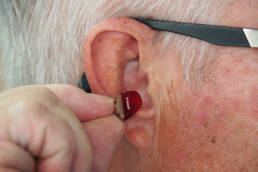NEW YORK (January 5, 2024) – Glaucoma affects over 3 million people in the United States and is often called the “silent thief of sight” because it robs people of vision slowly and without early symptoms. January is Glaucoma Awareness Month, a great time to emphasize the importance of regular eye check-ups for early detection of glaucoma and other eye diseases.
Glaucoma damages the eye’s optic nerve. As the disease progresses, it can lead to permanent vision loss. Many misconceptions exist about glaucoma, potentially causing people to underestimate their risk. Knowing the facts and knowing that early diagnosis and treatment are crucial to preventing vision loss is essential.Myth: People with good vision are immune to glaucoma
Fact: Most forms of glaucoma progress without any symptoms; therefore, it is crucial to have a comprehensive dilated eye exam that can detect the disease in its early stages. People with good vision may not notice symptoms until the late stages; however, early detection and treatment increase the chances of preserving vision.
Myth: Glaucoma cannot be treated
Fact: “It’s important to know that while glaucoma cannot be prevented or cured, it is treatable,” says Dr. Laura Sperazza, Director of Vision Rehabilitation Services at Lighthouse Guild. Glaucoma does not have to lead to blindness. Early intervention can protect vision. Treatments such as prescription eye drops, oral medicines, laser treatment, and surgery can slow or prevent vision loss from glaucoma.
Dr. Laura Sperazza
Myth: Only older people get glaucoma
Fact: Although people over 60 face a higher risk of developing glaucoma, certain types of glaucoma can affect younger individuals, including children and infants.
Myth: Absence of family history means no risk of glaucoma
Fact: Glaucoma can run in families. However, it can affect anyone, including people with no family history. Regular eye screenings are essential for everyone.
Myth: I would know if I had glaucoma
Fact: During its initial stages, glaucoma typically exhibits no symptoms. Many people remain unaware that they have the condition due to the gradual nature of vision changes. Difficulties with peripheral vision may be the first symptom they notice. If left untreated, glaucoma can eventually cause permanent blindness.
Knowing the facts is key to maintaining optimal eye health and preventing vision loss from glaucoma. It is important to get routine examinations and not to ignore problems with hazy or blurred vision, driving at night, colored halos around lights, peripheral vision, eye pain or redness, and difficulty walking due to the inability to see curbs and steps. Only an eye care professional can determine if these symptoms are related to glaucoma or other eye conditions and begin treatments to protect vision. Anyone who experiences sudden vision changes or significant eye pain should seek an immediate consultation with their doctor or go to an emergency room.
About Lighthouse Guild
Lighthouse Guild provides exceptional services that inspire people who are visually impaired to attain their goals. We provide coordinated care for eye health, vision rehabilitation, and behavioral health as well as related services. Our podcast series, “On Tech & Vision with Dr. Cal Roberts,” offers information and insights about technological innovations that are tearing down barriers for people who are blind or visually impaired. For more information, visit Lighthouseguild.org.
Source: Lighthouse Guild
Press Contact: Bryan Dotson, Manners Dotson Group
917-796-8632, [email protected]


















































































































